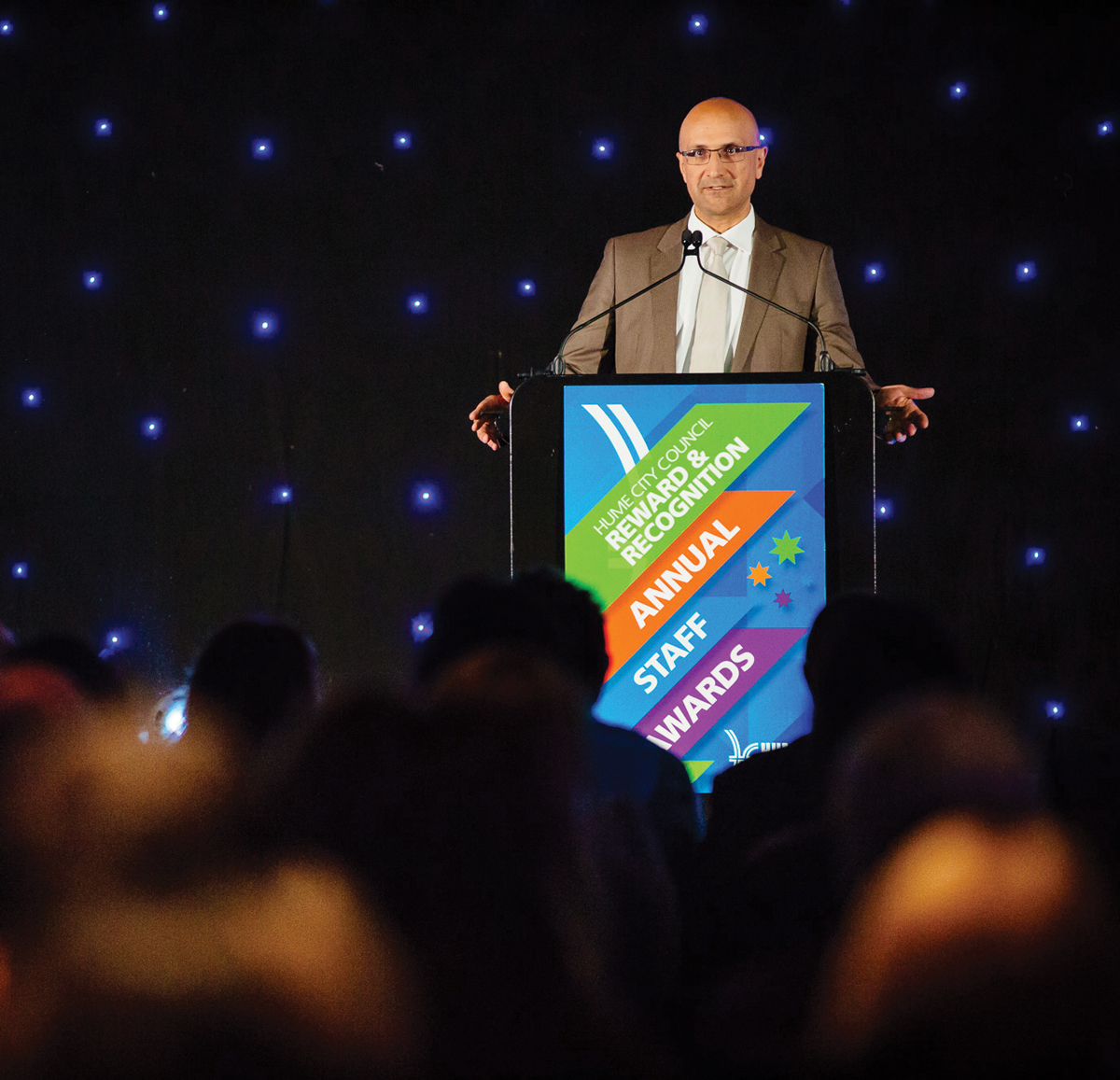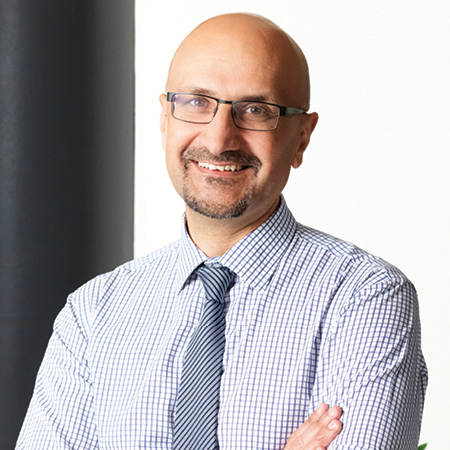As first days on a new job go, Domenic Isola’s can be described as inauspicious at best. It was 1999 and Hume City Council’s new CFO had joined on annual budget night. The council was technically insolvent. “My first question was: why?” he recalls. “Why wasn’t the council solvent? Why wasn’t it liquid?” Under his guidance, the council went back to basics, putting together a long-term plan that included a debt strategy, rating strategy, investment strategy, and a strong emphasis on cashflow management.
“It didn’t happen overnight,” Domenic says, “but through the course of budgeting, reviewing and operating in a certain way, we have changed how things were done.”
Back in the black
Domenic rose to the position of CEO in 2007, and in the 2015–16 financial year Hume City Council declared itself debt-free for the first time since its inception. Today, the council, located north of Melbourne city centre, manages a $330-million recurrent budget, employs 1,500 staff, is able to spend $70 million in new capital works and, crucially, generates a surplus.
Domenic credits his background in banking and finance for preparing him for the challenges faced through his career in local government. “Council is not a business, but I believe it should be businesslike,” he says. “If you have financial capacity, then it makes things a bit easier for a council to give the community the types of things it needs — for example, facilities, services and infrastructure.”
Fitter financial practices
Acknowledging that poor financial practices over time were responsible for much of the council’s previous financial troubles, Domenic emphasises the importance of ensuring the council spends within its means. “I sit down with every manager to work through their budget, assess the goals and outcomes, and what the costs of the operation are,” he says. “From there, globally we look at what the council can afford.”

“If you have financial capacity, then it makes things a bit easier for a council to give the community the types of things it needs.” – Domenic Isola
The council generates revenue not just from rates but from a variety of sources, including state and federal grants. Rate-capping — the controversial Victorian State Government legislation currently set at 2.5% — limits the amount council rate increases can play in its revenue-raising capabilities. “It certainly adds to the pressure we face.
In most communities, there are lots of wants and needs, but the capacity to deliver each of these needs to be balanced with the ability to pay,” he says.
A multicultural community with multifaceted needs
Hume City Council was formed in 1994, the result of an amalgamation between the City of Broadmeadows, the City of Whittlesea, the City of Keilor, and the Shire of Bulla. Spanning an area of more than 500 square kilometres and with a population of 200,000, Hume City Council certainly understands the pressures a large, multicultural community presents. “Our diversity in terms of background, living standards, and economic advantage is well known. We have different communities, in different locations, with different needs,” he says, addressing the challenges of answering to such a varied stakeholder base.

“So we need to do things at different levels.” This can take the form of building community infrastructure, community facilities, common meeting spaces, or natural, open spaces in what he labels “growing areas,” such as Craigieburn and Sunbury. In the more established suburbs, including Broadmeadows, Tullamarine and Gladstone Park, the focus is placed on the regeneration of assets and making sure the services already in place are still relevant to the community.
“There might be a greater need for preschools in our growing community, so funds will be allocated there,” he explains. “That will not be the case in built-up areas where the need for preschools has diminished and the preschool may be closed or sold off.” Domenic comments, “One of the things we do well here is making sure we use the facilities and assets we have to a level that benefits the community. To me, it’s no good having a facility sitting there that’s not being used.”
Pinpointing priorities
Asset-rich, the council has a portfolio worth in excess of $2.6 billion, so allocating funds towards ongoing maintenance is a top priority. Yet, with population growth occurring at 4% per annum, it comes as no surprise that social justice and education are given precedence in council spending.
“If there’s a question, for example, between whether we build a preschool or a leisure centre, the council would try to make sure that the learning component, the early education, is done first,” he says. “Our emphasis is on learning, so we would build the preschool as and when required. The leisure development might just need to wait a bit longer.”
When rapid growth meets existing demand, Domenic admits, “At any point in time, there’s always something else that needs to be done.” Along with the challenges of managing ongoing needs (“the next facility, the next major program, the review of service”) to the best of its capabilities with the resources available, the impact that decisions made at state government level have at a local government level also require skillful navigation. “You can have a plan, but there are some things you simply have no control over,” he says.
Times of turmoil

He recalls a moment, four years ago, when he was told that the then Liberal state government had decided that Sunbury was to become a separate council from Hume. “How do you separate an entity?” he asks. “It was an enormous challenge, and not just in terms of the physical resources, the assets. That was fairly simple.” The human resources, however, proved to be much more complicated. “People wanted to know how the new council was going to be staffed. Who was going to transfer over? Did they have a job?” he recalls. “It was incredibly emotive, a time of great uncertainty and anxiety.”
“I wish someone would give me back those three years of my life. There are a lot of things we didn’t achieve for the community during that time, which we could have.” – Domenic Isola
The council spent three years preparing for the separation, only to be told by the incumbent Labour government in Victoria that it would not proceed. “I wish someone would give me back those three years of my life,” he says. “There are a lot of things we didn’t achieve for the community during that time which we could have.”
Stellar staff engagment
The turmoil of the past few years, however, only served to reinforce how important his people are. “Even during the uncertainty surrounding the merger, our staff engagement results have been off the planet,” he says. “The staff really strive to do the best they can for the community.”
He believes this engagement is driven by thorough recruitment and clear communication of company values throughout the hiring process. “These are respect, innovation, collaboration and customer focus,” he says. “I don’t care if you can repeat those four words; I only care about the behaviour that demonstrates an understanding of them. We have a simple objective that, irrespective of your position in the council, everything you do every day should be about making something better for the community. You should do that in a way that represents our values set.” With that in mind, what is he working on today to make things better for tomorrow?
A more efficient future
Domenic spends a moment reflecting on his financial background. “Accountants,” he answers, “display a real bent towards efficiency, effectiveness and outcomes. We’re very good at using matrix and measurements to determine if we’re hitting the right spots and if we’re being as efficient as we can be.” It’s a word that’s dominated his tenure at the council, and now that he’s no longer distracted by the possibility of a council demerger, he can focus on it. “We’re driving efficiency and effectiveness across the organisation.”
Having identified 28 service areas to test and interrogate, Domenic explains, “We will assess each of these functions. What is it we’re trying to achieve? What resources do we need to get there? How do we know we’re on the right path? Should we be doing something else instead?
“We need to ensure that we prepare ourselves for the next five to 10 years,” he says, “to ensure we continue to deliver for our community, that we are sustainable, and that we look after our great staff.”

